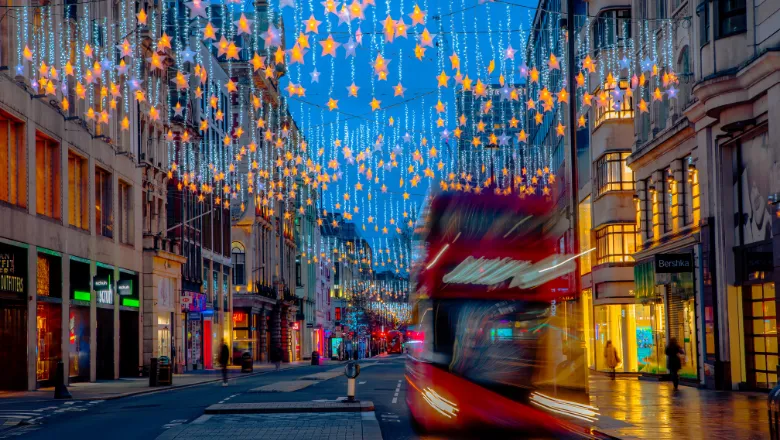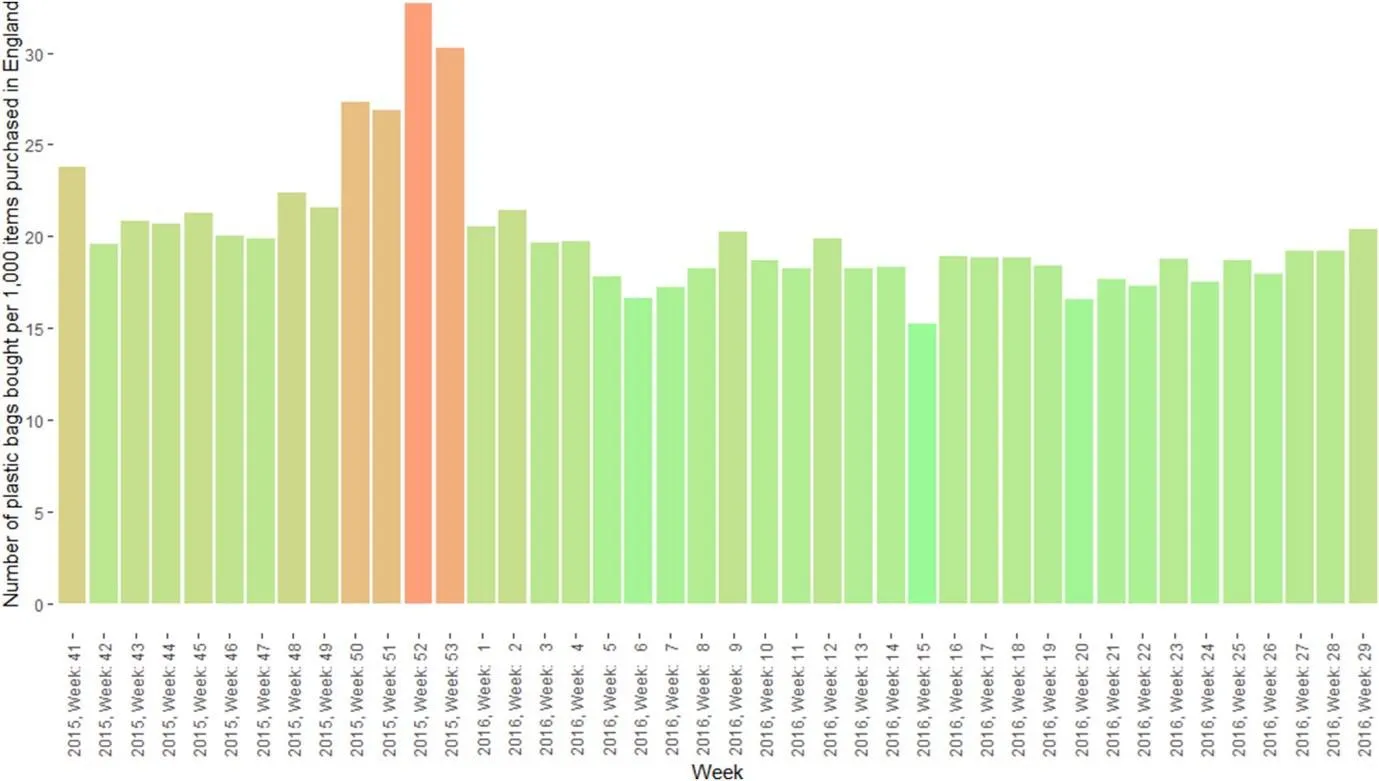These seasonal purchases fill our homes and amplify the holiday spirit, but they also come with a hefty psychological, financial, and environmental cost."
02 December 2024
Christmas over-consumption: Why we shop the way we do (even climate activists!)
Dr Byungdoo Kim, Research Associate at the Centre for Sustainable Business
Research shows that even sustainability champions can set aside their beliefs and practices during Christmas. In this article, Dr Byungdoo Kim peels back the layers of festive marketing to uncover why we shop the way we do during Christmas, and how we can make small changes for a more sustainable Christmas.

Christmas is coming. The streets are filled with carols and dazzling decorations, helping us forget the cold. We’re all beginning to think about gifts for family, friends, and partners. And, even if it’s not for someone else, the flood of discounts and deals tempts us to treat ourselves to a few presents as well.
For those working in retail and service industries, however, this season brings a different kind of ‘gift’—a boost in sales. By December, all sorts of marketing strategies are in play, aiming to capitalize on the Christmas and Boxing Day shopping peaks. Brits are budgeting around £362 for Christmas gifts this year, with an additional £317 for festive food and drinks—and every business is competing for a slice of that profitable mince pie.
It’s not just gifts, either. Christmas consumption extends to food, party supplies, decorations, trees, and more. These seasonal purchases fill our homes and amplify the holiday spirit, but they also come with a hefty psychological, financial, and environmental cost. What drives us to invest so much in this season, often knowing the toll it may take?
Psychological drivers behind increased seasonal consumption
During the Christmas season, people spend more than at any other time of the year. Even environmental advocates tend to momentarily set aside their beliefs and practices during Christmas, as shown in the study by Langhof & Deuringer: ‘I want to be green but what about the Christmas Tree?’. This could be due to several reasons, such as not wanting to hurt relatives’ feelings, wishing to respect social norms and traditions, and often lacking complete control over situations when invited by others.
This shift in priorities may also arise because family relationships and social bonds take precedence over environmental concerns during the festive period. But there are other psychological factors at work here, ones that can push even the most conscientious shopper to buy more than what is necessary.
Even environmental advocates tend to momentarily set aside their beliefs and practices during Christmas."
The power of comparison
Social Comparison Theory, introduced by Leon Festinger nearly 70 years ago, suggests that we determine our social and personal worth based on how we compare to others. Despite its age, the theory continues to be relevant today, manifesting in new and evolving ways. In today’s digital age, this phenomenon is magnified by social media platforms, where the prevalence of ‘toxic positivity’ creates idealized portrayals of life that often exclude negative or challenging aspects.
Before and during the holiday season, social media becomes flooded with images of lavish celebrations, extravagant gifts, and picture-perfect family gatherings, setting an unspoken standard for what a ‘proper’ Christmas should look like. As for the Christmas adverts on TV—these have practically become their own genre, with 30-second ads going viral for their cinematic mastery.
Constant exposure to this level of social media and professional marketing can intensify negative feelings such as inadequacy, pushing people towards excessive consumption in an attempt to compensate for emotional dissatisfaction.
The fear of missing out (FOMO)
Another psychological factor that drives consumption during the holiday season is ‘FOMO’. This is an especially powerful trigger during this period, and many marketing strategies are designed to exploit it.
Sellers emphasize scarcity through various limited-time deals, creating a sense that if you don’t purchase now, you’ll miss out and feel a sense of loss. People strive to avoid feeling excluded and often dread the regret of missed opportunities. For example, when consumers miss out on a limited-time deal, they tend to reflect on what they could have gained. This reflection leads to feelings of regret and dissatisfaction (‘regret of omission’), which may further fuel their desire to buy.
Major online shopping platforms also display advertisement banners with phrases like ‘Countdown to Black Friday Deals’ and ‘Get ready to save big’ (see image 1). These ads don’t even directly urge you to buy; instead, they encourage you to take advantage of the ‘deal’—because without buying, there’s no saving.

The Environmental Impact of Holiday Overconsumption
The surge in consumption during the holiday season has significant and far-reaching environmental consequences. One of the most immediate effects is the substantial increase in waste: from excessive packaging and disposable items to unsustainable gifts and surplus food that goes unsold.
While some of this waste can be recycled, a large portion inevitably ends up in landfills. Sadly, adding to the environmental burden, approximately 15% of US purchases made during the holiday season are returned. This high return rate significantly contributes not only to waste increase but also to higher carbon emissions, especially due to the transportation required for shipping items back and forth.
Approximately 15% of purchases in the US made during the holiday season are returned."
Whilst party decorations and novelty gifts may be appealing and fun, they are often used briefly before being discarded, contributing to an increase in overall waste levels.
According to the UK Environment Agency, household waste increases by as much as 30% during this festive period. Research by Lavelle-Hill et al. supports this trend by showing that plastic bag usage skyrockets from Black Friday through the end of the year, exacerbating plastic pollution (see image 2).

Make mindful choices for this Christmas
So, what can we do this Christmas? It might be helpful to think about the lifecycle of the items we plan to purchase. Lifecycle thinking involves asking critical questions about a product’s journey, such as:
- Where and how was it made?
- How did it come to me?
- How much energy will it use?
- How long will it last?
- How can it be disposed of at the end of its life?
Admittedly, this is not an easy task because manufacturers and sellers often do not provide detailed information about their supply chains, manufacturing processes, or environmental impacts (however, there is emerging research for businesses on mindful consumption, advocating for a customer-centric approach to sustainability).
As a shopper, it’s important to ask these questions and adopt a more mindful approach toward holiday goods, which can guide us to make sustainable choices.
Prioritise eco-friendly products
If you’re looking for alternatives, prioritizing eco-friendly products is a great start. Investigate the lifecycle of the items you intend to buy and look for brands that prioritize durability and ethical manufacturing.
Shopping locally can also be an effective alternative; it supports community retailers and reduces the environmental costs associated with long-distance transportation. Cities like London have amazing flea markets where you can explore second-hand goods, lowering your impact and contributing to the circular economy.
Gift an experience
Another alternative is to consider experiential gifts, such as event tickets, club memberships, concerts, or shared activities, like a ‘Brew your own Beer’ class, or an immersive art experience. Research by psychologist Thomas Gilovich suggests that people derive greater and longer-lasting satisfaction from experiential purchases than from material ones. Experiences don’t lose their appeal as quickly over time and are also less subject to social comparison.
In the end, navigating the pressures of the season—from social media influences to tempting holiday deals—can be tricky. But Christmas doesn’t need to be defined by consumption to feel special. By making a few mindful and sustainable choices, we can fill our holidays with more meaning, joy, and connection. After all, it’s the little moments, shared laughter, and time with loved ones that make this season memorable.
*
Dr Byungdoo Kim is a Research Associate at the Centre for Sustainable Business. His research explores sustainable consumption behaviour, with a scholarship grounded in environmental psychology and communication.
Resources and further reading
Interested in learning more about sustainable consumption? Here’s a list of all the research referenced in this article:
- Clash of beliefs: ‘I want to be green but what about the Christmas tree?’ Langhof, A., & Deuringer, V. (2020). An exploratory study on the role of a sustainable lifestyle for green consumers during Christmas (Unpublished master's thesis). Lund University, Sweden.
- Gifts, sustainable consumption and giving up green anxieties at Christmas. Farbotko, C., & Head, L. (2013). Geoforum, 50, 88-96.
- A theory of social comparison processes. Festinger, L. (1954). Human Relations, 7, 117-140.
- Toxic positivity intentions: An image management approach to upward social comparison and false self-presentation. Salopek, A. H., & Eastin, M. S. (2024). Journal of Computer-Mediated Communication, 29, zmae003.
- ‘It’s just one big vicious circle’: Young people’s experiences of highly visual social media and their mental health. McCrory, A., Best, P., & Maddock, A. (2022). Health Education Research, 37, 167-184.
- ‘Fear of Missing Out’(FOMO) marketing appeals: A conceptual model. Hodkinson, C. (2019). Journal of Marketing Communications, 25, 65-88.
- FOMO and regret for non-doings. Metz, J. (2019). Social Theory and Practice, 451-470.
- Psychological and demographic predictors of plastic bag consumption in transaction data. Lavelle-Hill, R., Goulding, J., Smith, G., Clarke, D. D., & Bibby, P. A. (2020). Journal of Environmental Psychology, 72, 101473.
- Sustainable consumption and resource management in the light of life cycle thinking. Mont, O., & Bleischwitz, R. (2007). European Environment, 17, 59-76.
- Measuring what matters in sustainable consumption: An integrative framework for the selection of relevant behaviors. Geiger, S. M., Fischer, D., & Schrader, U. (2018). Sustainable Development, 26, 18-33.
- Mindful consumption: A customer-centric approach to sustainability. Sheth, J. N., Sethia, N. K., & Srinivas, S. (2011). Journal of the Academy of Marketing Science, 39, 21-39.
- A wonderful life: Experiential consumption and the pursuit of happiness. Gilovich, T., Kumar, A., & Jampol, L. (2015). Journal of Consumer Psychology, 25, 152-165.

